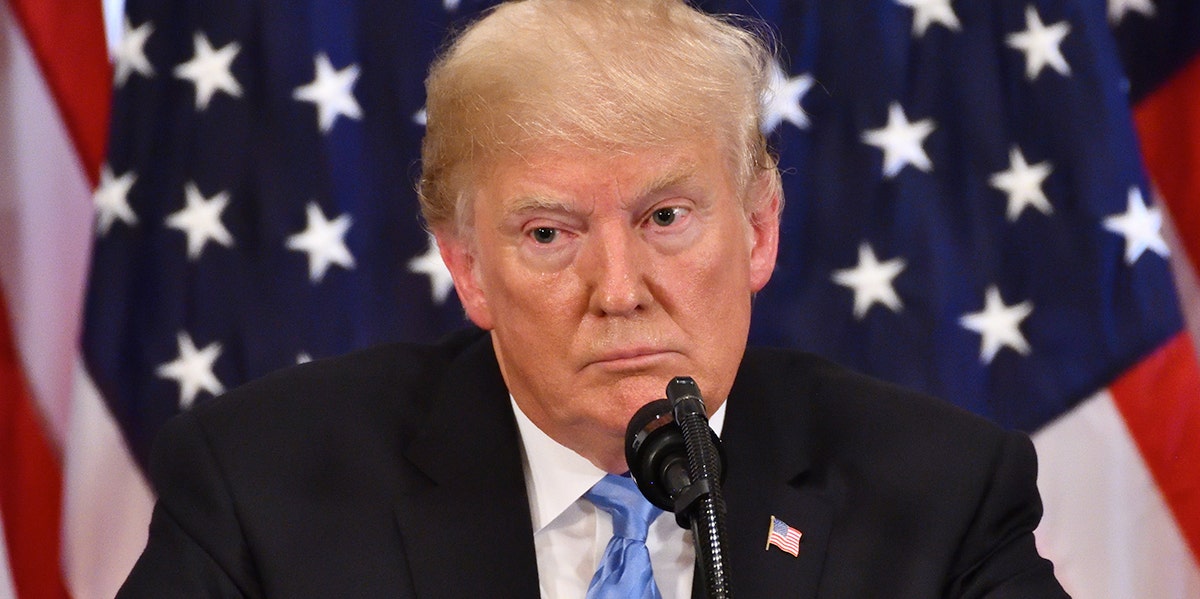6 Pieces Of Evidence That Prove Trump Is Guilty Of Inciting The Capitol Riots — And Should Be Impeached
The evidence is stacking against him.
 Evan El-Amin / Shutterstock
Evan El-Amin / Shutterstock The historic second impeachment trial of former president Donald Trump is underway, and the evidence against him is slowly, but surely, mounting.
Leaving aside the political rancor of the entire situation, the facts of the case — specifically, the facts that discuss what happened on the morning of January 6, 2021, in what is now being called the Capitol Hill Riots — seem to not bode well for The Apprentice star.
Trump's defense team slated to finish their closing arguments on Feb. 12, and the trial could come to a close as soon as the weekend hits.
Is Donald Trump guilty of inciting the Capitol Hill Riots, and should he be impeached?
Let's take a look at the facts that suggest he just might be.
1. The speech he gave on that day.
Just a few hours before the insurrectionists stormed the Capitol on the 6th of January, Donald Trump gave one of the most incendiary speeches of his career.
In the speech, which you can see below, he told his crowd of supporters, repeatedly, to "fight" (a word he used at least 20 times).
He also told the crowd that they "must not take it any longer," then told them to "be strong" and "march on the Capitol."
While his lawyers are arguing that Trump's speech is protected by the First Amendment, prosecutors are arguing that speech that incites violence is not protected by 1A (and they cite the so-called "fire in a crowded theater" clause as evidence; this is also known as the "imminent lawless" test, in which the speech is not protected if the speaker intends to incite a violation of the law that is both imminent and likely).
RELATED: Trump Wasn't Worried About My Health — Why Should I Worry About His?
2. His failure to stop the attack.
After he incited the mob that gathered to hear him talk, Trump reportedly watched the riots unfold live on television.
According to Joaquin Castro (D-TX 20th District), Trump subsequently did nothing about the attack as it was happening — and, in fact, tweeted about the attacks that seemed to encourage the mob even further — effectively leaving the Senators "for dead."
“On January 6, President Trump left everyone in this Capitol for dead,” Castro said.
“For the next hour after President Trump’s tweets, he still did nothing. Not until 4:17pm [Eastern US time or 09:17 GMT], over three-and-half hours after the violence started, did our president send a message finally ask the insurgents to go home.”
3. His failure to act on credible warnings prior to the Capitol Hill riots.
According to a report from the FBI in Virginia, via Reuters, violent extremists were preparing to descend onto the Capitol with the intent to "start a war."
The FBI is reporting that they did try to warn Trump of the imminent danger to the sitting lawmakers, and if Trump either knew of or recklessly disregarded the warning, he could be found guilty of inciting a riot.
4. The multiple tweets he sent out prior to the riots.
Twitter CEO Jack Dorsey seemed to do the world a favor when he permanently banned Trump from Twitter (though, arguably, it was too little, too late).
But according to Democrat impeachment leader Jamie Raskin (via DW), the tweets that Trump sent out prior to the riots are further proof that he not only knew that the mob would turn violent, but that he incited them to get violent.
And it's this knowledge that prompted Raskin to call Trump the "inciter-in-chief."
"Raskin cited multiple tweets sent by Trump ahead of January 6, one of which told his supporters to "be there, will be wild." He also said the people participating in the protest and later riot at the Capitol "were invited by the president," reports the outlet.
"Raskin dismissed defense claims that Trump was being impeached for "expressing an opinion," and accused Trump's attorneys of trying to "portray Trump as a guy on the street being persecuted for his ideas."
5. Multiple rioters claim Trump "told them to" storm the Capitol.
At the core of the claims lies the question, "Did Trump incite the rioters to storm the Capitol, thus committing high crimes and misdemeanors, which is an impeachable, if not a criminal, offense?"
If you believe Trump's lawyers, the answer is no — and whatever he did say is protected by the First Amendment.
But if you believe the rioters — more than a dozen of them, to be exact — they stormed the Capitol because Trump told them to.
"I believed I was following the instructions of former President Trump," said Garret Miller in a statement released to ABC News through his lawyer. "I also left Washington and started back to Texas immediately after President Trump asked us to go home."
6. He committed insurrection by the very definition of the word.
"A person found guilty of insurrection, which the U.S. code describes as someone who 'incites, sets on foot, assists or engages in any rebellion or insurrection' against the U.S. or 'gives aid and comfort thereto' faces up to 10 years in prison," reports Newsweek, while adding that while Trump most likely committed an impeachable offense, he may not have committed a criminal one.
Bernadette Giacomazzo is an editor, writer, photographer, and publicist whose work has been featured in People, Teen Vogue, BET.com, Us Weekly, The Los Angeles Times, The New York Post, and more.

